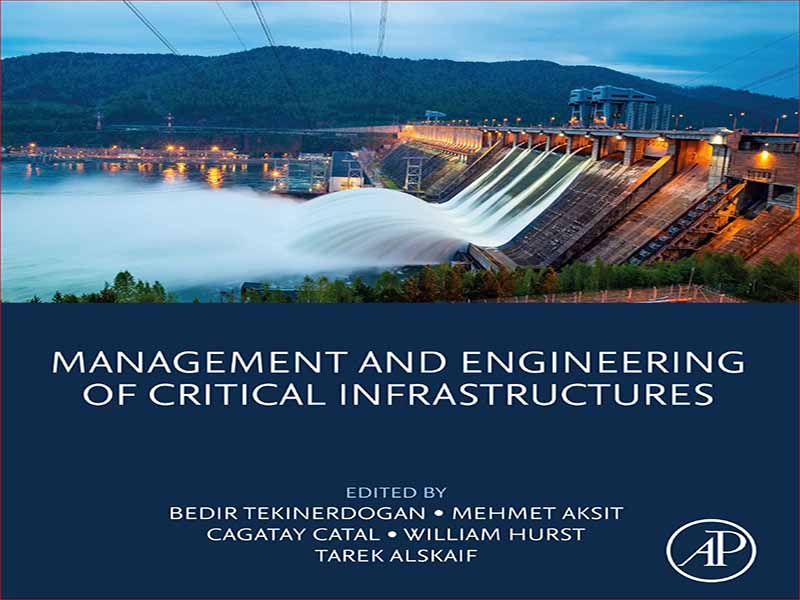- عنوان کتاب: Management and Engineering of Critical Infrastructures
- نویسنده: BEDIR TEKINERDOGAN
- حوزه: زیرساختهای حیاتی
- سال انتشار: 2024
- تعداد صفحه: 360
- زبان اصلی: انگلیسی
- نوع فایل: pdf
- حجم فایل: 19.7 مگابایت
در دنیای به هم پیوسته و مبتنی بر فناوری امروزی، سیستمهای زیرساخت حیاتی ستون فقرات جامعه مدرن هستند. این سیستم ها شامل حمل و نقل، انرژی، آب، مخابرات و سایر امکانات و خدمات ضروری است که زندگی روزمره ما را قادر می سازد. عملکرد مطمئن و ایمن سیستمهای زیرساخت حیاتی برای امنیت ملی، امنیت عمومی، رشد اقتصادی و رفاه افراد و جوامع ضروری است. مدیریت و مهندسی زیرساختهای حیاتی یک زمینه پیچیده و میان رشتهای است که نیازمند درک عمیق عوامل فنی، اجتماعی، اقتصادی و سیاسی است که بر طراحی، بهرهبرداری و نگهداری آنها تأثیر میگذارد. این شامل استفاده از اصول مهندسی، شیوههای مدیریت و چارچوبهای خطمشی برای اطمینان از انعطافپذیری، پایداری و کارایی سیستمهای زیرساخت حیاتی است. این کتاب مروری جامع از آخرین پیشرفتها در مدیریت و مهندسی زیرساختهای حیاتی ارائه میکند. این کتاب طیف گسترده ای از موضوعات را پوشش می دهد، از جمله، اما نه محدود به موارد زیر: طراحی و بهینه سازی سیستم: این کتاب طراحی و بهینه سازی سیستم های زیرساختی حیاتی، از جمله شبکه های حمل و نقل، شبکه های انرژی، و سیستم های توزیع آب را پوشش می دهد. نویسندگان رویکردها و تکنیکهای مختلفی را برای طراحی و بهینهسازی این سیستمها برای اطمینان از قابلیت اطمینان، کارایی و پایداری آنها مورد بحث قرار میدهند. ارزیابی ریسک: این کتاب اهمیت ارزیابی ریسک در شناسایی و ارزیابی آسیبپذیریهای سیستمهای زیرساخت حیاتی را پوشش میدهد. روش ها و ابزارهای مختلف برای انجام ارزیابی ریسک را مورد بحث قرار می دهد و چالش ها و فرصت ها را در این زمینه برجسته می کند. ارزیابی عملکرد: این کتاب اهمیت ارزیابی عملکرد در ارزیابی اثربخشی سیستمهای زیرساخت حیاتی را پوشش میدهد. روش ها و ابزارهای مختلف ارزیابی عملکرد را مورد بحث قرار می دهد و چالش ها و فرصت ها را در این زمینه برجسته می کند. امنیت سایبری: این کتاب اهمیت امنیت سایبری را در محافظت از سیستمهای زیرساختی حیاتی در برابر حملات سایبری پوشش میدهد. روش ها و ابزارهای مختلف امنیت سایبری را مورد بحث قرار می دهد و چالش ها و فرصت ها را در این زمینه برجسته می کند. مدیریت اضطراری: این کتاب اهمیت مدیریت اضطراری را در پاسخ به اختلالات زیرساختی حیاتی، مانند بلایای طبیعی یا حملات سایبری پوشش میدهد. این مقاله رویکردها و تکنیک های مختلف مدیریت اضطراری را مورد بحث قرار می دهد و چالش ها و فرصت ها را در این زمینه برجسته می کند. پایداری: این کتاب اهمیت پایداری را در تضمین دوام طولانی مدت سیستمهای زیرساخت حیاتی پوشش میدهد. اصول و چارچوب های مختلف پایداری را مورد بحث قرار می دهد و چالش ها و فرصت ها را در این زمینه برجسته می کند. انعطافپذیری: این کتاب اهمیت تابآوری را در حصول اطمینان از اینکه سیستمهای زیرساختی حیاتی میتوانند در مواجهه با اختلالات یا بلایا به کار خود ادامه دهند، پوشش میدهد. رویکردها و تکنیک های مختلف برای ایجاد انعطاف پذیری در این سیستم ها را مورد بحث قرار می دهد و چالش ها و فرصت ها را در این زمینه برجسته می کند. خطمشی و مقررات: این کتاب اهمیت سیاست و مقررات را در مدیریت و مهندسی سیستمهای زیرساخت حیاتی پوشش میدهد. این چارچوبهای مختلف سیاستگذاری و نظارتی و تأثیر آنها بر مدیریت و مهندسی زیرساختهای حیاتی را مورد بحث قرار میدهد. وابستگی های متقابل: این کتاب وابستگی های متقابل بین سیستم های مختلف زیرساخت های حیاتی و نیاز به در نظر گرفتن این وابستگی ها در مدیریت و مهندسی این سیستم ها را پوشش می دهد. روش ها و ابزارهای مختلفی برای تجزیه و تحلیل و مدیریت این وابستگی ها مورد بحث قرار می گیرد. نوآوری و فناوری های نوظهور: این کتاب اهمیت نوآوری و فناوری های نوظهور را در مدیریت و مهندسی سیستم های زیرساخت حیاتی پوشش می دهد. این فنآوریهای مختلف مانند هوش مصنوعی، بلاک چین و اینترنت اشیا و تأثیر بالقوه آنها بر مدیریت و مهندسی زیرساختهای حیاتی را مورد بحث قرار میدهد. این کتاب مشارکتهای کارشناسان برجسته در این زمینه، از جمله مهندسان، مدیران، سیاستگذاران و دانشگاهیان را گرد هم میآورد تا دیدگاهی چند رشتهای در مورد مدیریت و مهندسی زیرساختهای حیاتی ارائه دهد.
In today’s interconnected and technology-driven world, critical infrastructure systems are the backbone of modern society. These systems include transportation, energy, water, telecommunications, and other essential facilities and services that enable our daily lives. The reliable and secure operation of critical infrastructure systems is essential for national security, public safety, economic growth, and the well-being of individuals and communities. The management and engineering of critical infrastructures are a complex and interdisciplinary field that requires a deep understanding of the technological, social, economic, and political factors that influence their design, operation, and maintenance. It involves the application of engineering principles, management practices, and policy frameworks to ensure the resilience, sustainability, and efficiency of critical infrastructure systems. This book provides a comprehensive overview of the state-of-the-art in the management and engineering of critical infrastructures. It covers a wide range of topics, including but not limited to the following: System design and optimization: The book covers the design and optimization of critical infrastructure systems, including transportation networks, energy grids, and water distribution systems. The authors discuss various approaches and techniques for designing and optimizing these systems to ensure their reliability, efficiency, and sustainability. Risk assessment: The book covers the importance of risk assessment in identifying and evaluating the vulnerabilities of critical infrastructure systems. It discusses various methods and tools for conducting risk assessments and highlights the challenges and opportunities in this area. Performance evaluation: The book covers the importance of performance evaluation in assessing the effectiveness of critical infrastructure systems. It discusses various performance evaluation methods and tools and highlights the challenges and opportunities in this area. Cybersecurity: The book covers the importance of cybersecurity in protecting critical infrastructure systems from cyber-attacks. It discusses various cybersecurity methods and tools and highlights the challenges and opportunities in this area. Emergency management: The book covers the importance of emergency management in responding to critical infrastructure disruptions, such as natural disasters or cyber-attacks. It discusses various emergency management approaches and techniques and highlights the challenges and opportunities in this area. Sustainability: The book covers the importance of sustainability in ensuring the longterm viability of critical infrastructure systems. It discusses various sustainability principles and frameworks and highlights the challenges and opportunities in this area. Resilience: The book covers the importance of resilience in ensuring that critical infrastructure systems can continue to function in the face of disruptions or disasters. It discusses various approaches and techniques for building resilience in these systems and highlights the challenges and opportunities in this area. Policy and regulation: The book covers the importance of policy and regulation in managing and engineering critical infrastructure systems. It discusses various policy and regulatory frameworks and their impact on critical infrastructure management and engineering. Interdependencies: The book covers the interdependencies among different critical infrastructure systems and the need to consider these interdependencies in the management and engineering of these systems. It discusses various methods and tools for analyzing and managing these interdependencies. Innovation and emerging technologies: The book covers the importance of innovation and emerging technologies in the management and engineering of critical infrastructure systems. It discusses various technologies, such as artificial intelligence, blockchain, and the Internet of Things, and their potential impact on critical infrastructure management and engineering. The book brings together contributions from leading experts in the field, including engineers, managers, policymakers, and academics, to provide a multidisciplinary perspective on critical infrastructure management and engineering.
این کتاب را میتوانید از لینک زیر بصورت رایگان دانلود کنید:
Download: Management and Engineering of Critical Infrastructures




































نظرات کاربران